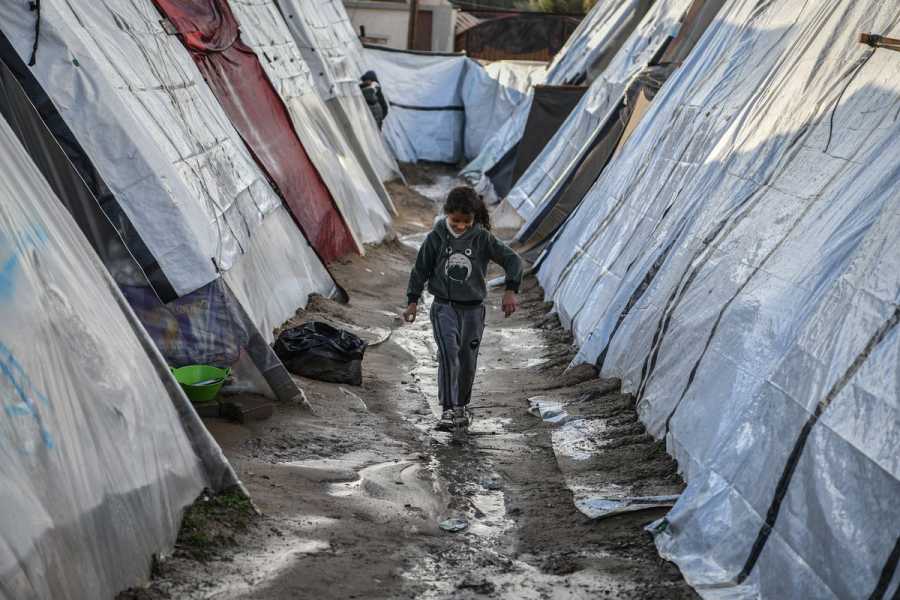Voices from a besieged Rafah.

Palestinian children are seen among tents as they struggle with strong winds, downpours, and floods while Israeli attacks continue in Rafah of Gaza on February 15, 2024. Abed Zagout/Anadolu via Getty Images
More than four months into the Israel-Hamas war, Gaza residents are struggling to survive winter conditions with insufficient food, drinking water, medicine, and clothing.
The majority of them have fled to Rafah, a city in the south bordering Egypt. With a prewar population of about 280,000 residents, Rafah is now housing nearly 1.5 million refugees, according to the United Nations agency for Palestinian refugees (and confirmed by satellite images).
It was, theoretically, a refuge from the intense shelling and ground operation Israel launched after Hamas brutally attacked the country on October 7. That sense has been shattered this week. Israeli airstrikes on Monday killed about 100 people, and Israeli Prime Minister Benjamin Netanyahu has indicated a ground offensive might be imminent.
Meanwhile, negotiations have stalled on discussions of a ceasefire deal and a hostage and prisoner swap between Israel and Hamas.
The negotiations, helmed by the United States, Egypt, and Qatar, ground to a halt Wednesday after Netanyahu called his delegates back from a summit in Cairo, accusing Hamas of presenting “delusional” demands in order to avoid a deal.
The relatives of the estimated 130 remaining hostages said the decision amounts to a “death sentence” for their family members languishing in Hamas captivity, about a quarter of whom are presumed dead.
And it leaves the Palestinians sheltering in Rafah feeling even more hopeless. The Today, Explained podcast team spoke with Aseel Mousa, a Palestinian freelance journalist who grew up in Gaza, about how we got here, what it’s like on the ground right now, and what happens next.
How so many Palestinians ended up in Rafah
As Israel started its aerial bombardment — following the October 7 Hamas attacks, which killed about 1,200 Israelis, with more than 240 people taken hostage — it directed Gazans to flee south to avoid the fighting. That was always a fraught directive in a territory the size of Detroit but almost four times its population. But as the war has progressed, more than 85 percent of Palestinians in Gaza have been displaced.
Mousa’s family is among them. On October 13, her family left their home outside Gaza City and sought shelter in the al-Maghazi refugee camp in the central Gaza Strip.
For about 80 days, they stayed in her grandfather’s house along with about 40 other displaced people.
“The situation there was dire,” Mousa said. “We faced severe shortages of food, running water, and even drinkable water. And also Israel cut off electricity, communication lines, and internet access.”
“And even though Israel claimed that area as a safe area, I lost 10 people of my family,” she added. “Israel targeted the house of my cousins. And as a result, 10 of my relatives were killed. Seven of them were children. And one of them was a woman. And the others were young men.”
Rafah, refuge no more
Mousa’s childhood home and her grandfather’s home in al-Maghazi were both bombed. As Israeli airstrikes intensified, her family fled farther south, to Rafah.
Now, she and over a million other Palestinians are trapped. A sense of despair pervades Rafah, said Matthew Hollingworth of the World Food Programme, where people are scavenging for food, fuel, and shelter amid “damp, cold, and miserable” conditions. Mousa has been documenting their stories.
vox-mark
Sign up for the newsletter Today, Explained
Thanks for signing up!
Check your inbox for a welcome email.
Email (required)
Oops. Something went wrong. Please enter a valid email and try again.
By submitting your email, you agree to our Terms and Privacy Notice. You can opt out at any time. This site is protected by reCAPTCHA and the Google Privacy Policy and Terms of Service apply. For more newsletters, check out our newsletters page. Subscribe
She called Monday’s assault “a night of terror beyond description” but said compounding the fear of death is the lack of basic supplies:
“The Israeli bombardment is hard in itself, being under fire, under bombardment, she said. “But being under bombardment without even the essential needs — such as food, water, medical supplies, medicines — is making the problem or the tough time harder than enduring it with only bombing.”
Is a ground offensive coming?
Israeli officials say Rafah is Hamas’s last stronghold in Gaza, and that a ground offensive is needed to defeat Hamas and bring an end to the war.
The UN warned that such an operation would lead to “carnage.” But Netanyahu brushed aside concerns in a Fox News interview, saying, “I think the people who are telling you, ‘Oh, you can’t do it, you can’t go into Rafah under any conditions,’ are basically saying ‘Don’t win, lose.’”
Moussa says Rafah’s displaced population is dreading a ground invasion, which she said would be “a catastrophe, as … the people now have no place to go to.”
“What can we do?” she said. “We stay. We stay in the houses. In the tents. In the streets. In the shelters, waiting to be killed. We don’t have a plan F. We made the plan A, plan B, plan C. And we have no more plans.”
The threat of an invasion has increased pressure on US and other officials to get diplomatic negotiations back on track — for both an immediate deal and a longer-term solution.
Arab states insist that after a ceasefire deal is reached, a two-state solution is a prerequisite to normalizing relations with Israel and rebuilding a devastated Gaza Strip.
But Mousa and others like her in Rafah have more immediate concerns:
“We don’t have the luxury to think of the aftermath. We only think how to survive day by day. We think of how to flee from being killed.”
This story appeared originally in Today, Explained, Vox’s flagship daily newsletter. Sign up here for future editions.
Sourse: vox.com






